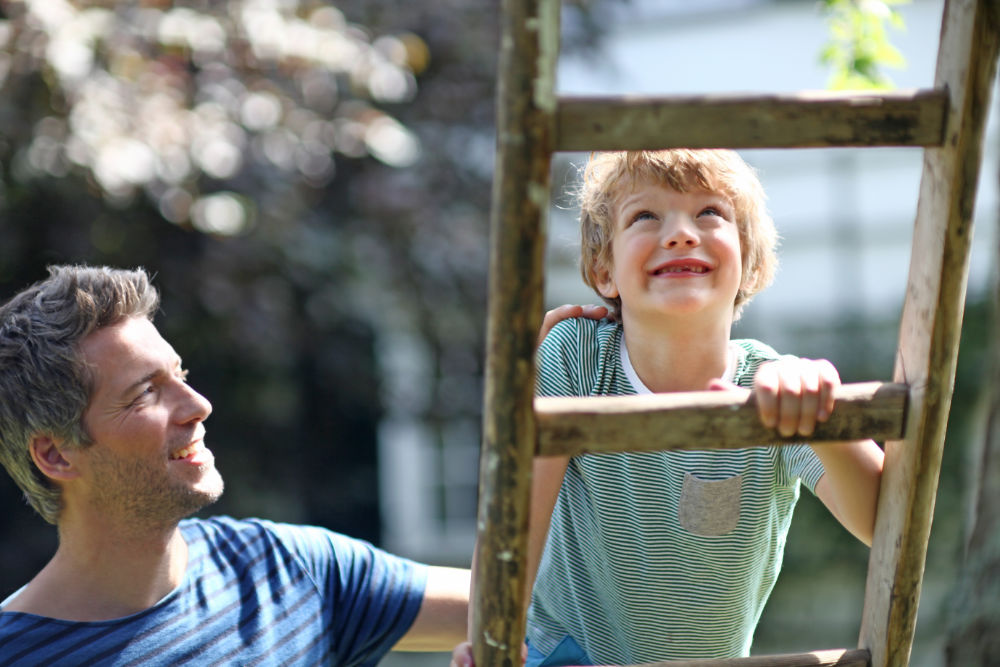Louis Divorce Mediation ~ Online and In-Person Mediation in Chicago
|
In divorce mediation I encourage divorcing parents to have a conversation about developing shared goals for their children.
From their birth, we want the best for our children and will willingly make sacrifices for them. This is an expression of our commitment to them—giving them the chance to see their dreams come true. In our own lives, we try to set personal goals. For our children, this can be a more challenging proposition. What is the parental role in imagining goals for our children? Where does our goal setting encroach on a child’s freedom to become his/her own person? This boundary between parents’ and children’s responsibility to set goals is an issue needing sensitivity and will vary, depending on the clients involved. Regardless, I always encourage you as parents to discuss your shared aspirations for your children. Imagine that your children, as young adults, are everything you had ever hoped they would be. What words would you use to describe them? In approaching this conversation, I find it most constructive to keep the focus on a broad, high-level vision of the children’s future. I introduce this discussion by asking one simple question: “Imagine that your children, as young adults, are everything you had ever hoped they would be. What words would you use to describe them?” This invites you as parents to share your goals for the kind of person you would like to see your children become. Some words I often hear are “confident,” “curious,” “independent” and “well educated.” There are no wrong answers, and most parents in my mediation practice can usually agree on a shared list. After we have created this list, I acknowledge that a child’s ability to become the adult who exemplifies these qualities will be partly the responsibility of the child in his/her own process of growing up. However, I believe that there is also a significant parental role to be played in shaping a child’s character. So I explore this by asking a second question: “Over the years, from now until your children are adults, what can you as parents do to help them become the persons you described in your envisioning exercise?” As clients discuss their response to this second question, we begin to establish a shared framework of how parents can work together after a divorce. Living in separate households, there is absolutely still the opportunity to give your children the love, attention, guidance and nurturing that will allow them to envision their own goals, receive your love and support, and climb that ladder to reach for and grab their dreams.
0 Comments
With Father’s Day approaching, I’ve been thinking about my dad, who is no longer with us except for fond memories of his life.
When I was growing up (1960s and early 1970s), most fathers were the primary earners in a family, and ours was no exception. My dad worked long hours, including a difficult commute into New York City from our suburban home. So our time together was mainly on weekends and vacations. Dad did his best to make weekends fun. As a teenager especially, we played a lot of tennis, a sport we both enjoyed. (I still play with passion, thanks to him.) I was fortunate. I grew up in a two-parent household where my parents worked together to create a healthy childhood experience for my siblings and me. The end of a marriage often requires a reevaluation of each parent’s role in the future co-parenting relationship—a relationship that will unfold in two separate households. In a family that is facing a divorce in current times, circumstances can be much different. Either parent may be the primary earner, and either parent may be the primary caretaker. Or both may work full time, and childcare may be handled with hired assistance (an expense that may not be as possible in the divorced circumstance). The end of a marriage often requires a reevaluation of each parent’s role in the future co-parenting relationship—a relationship that will unfold in two separate households. In the wake of a divorce, I’ve often heard a parent in mediation question the other spouse’s ability to change his or her way of demonstrating commitment to caring for the children. There is often a built-in (negative) expectation that the other spouse is incapable of change. It’s my feeling that, while it can be true that a spouse may not be willing to change to save a marriage, that same person may respond very differently to the challenge of becoming a co-parent. Parents may “step up,” based on a desire to reinforce love and concern for their children, even as they are choosing to relinquish the commitment to their marriage. In divorce mediation, we create a parenting plan that defines how children will be cared for, post-divorce. Included in that agreement can be an exploration of how each parent wants to respond to the challenge of change. There is discussion of expectations (each parent’s expectations for the other) and an expression of the willingness of each to meet the other’s needs as they commit to creating an ongoing and successful co-parenting relationship. On a final note, as I think about my dad and my own experience as a parent (of now-adult children), I realize I feel myself to be as much a parent today as I was when my children were younger. When I grew up and left home, I’m sure my own parents felt the same way. Parenting is a lifetime experience—a joy and a challeng—that involves an evolving job description as both parents and children grow older. In a recent online discussion among attorneys who are also mediators, this topic was raised: When neither spouse is currently dating or otherwise involved romantically with another person, what protocols will be followed for the children when someone new comes into the picture?
In planning for futures after divorce, mediation clients often struggle with this question. In my own mediation sessions, I encourage clients to explore the following with regard to new romantic relationships and their effect on children:
Based on the collective wisdom and preferences of the parents, making a plan for something that could likely happen in the future will reinforce the foundation of effective co-parenting. Arguably, it may be difficult to legally enforce any of the protocols agreed to in mediation and incorporated into a parenting plan. However, I endorse the concept that children benefit from a strong co-parenting relationship. Based on the collective wisdom and preferences of the parents, making a plan for something that could likely happen in the future will reinforce the foundation of effective co-parenting. In the dialogue that followed this question on my online call, what I found to be particularly interesting was how differently professionals viewed the question of how parents should approach this topic. One mediator (with extensive experience in working with children of divorce) spoke of the divorce establishing an opportunity for children to have an improved individual relationship with each parent. In divorce the parents both have a renewed focus on their children, instead of on their failed marriage. A new significant other could impact this strengthened relationship and may shift the parent’s focus off the children. That shift may in turn affect the child’s opinion of the new person and perhaps create a loyalty conflict for the child, if there is hostility expressed by the other parent. Another mediator contributed a different viewpoint, from personal experience. While agreeing that there should be some reasonable time period for the new relationship to have gained a suitable level of significance, the mediator spoke of the work done with the other parent. Together they promoted an environment of acceptance of a new significant other by the children. The positive results for this family included a new person to love the children and an enrichment of the family structure. What effect a new romantic relationship will have after divorce is something that cannot be easily answered, and, certainly, the answer will be unique for each family. The mediation process embraces the particular circumstances of each couple’s transition and poses hard questions with an aim to create a thoughtful approach to future developments. |
Categories |
David Louis, MPA, CDFA® • Louis Mediation Services - Chicago
|
Chicago Office: 1700 W Irving Park Rd., Suite 105, Chicago, IL 60613
Northbrook Office: 555 Skokie Blvd., Suite 500, Northbrook, IL 60062 |
Copyright © 2024




 RSS Feed
RSS Feed